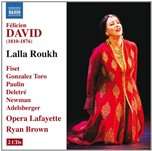|
Back
05/10/2014
Félicien David: Lalla Roukh
Marianne Fiset (Lalla Roukh), Emiliano Gonzalez Toro (Noureddin), Nathalie Paulin (Mirza), Bernard Deletré (Baskir), David Newman (Bakbara), Andrew Adelsberger (Kaboul), Opera Lafayette and Opera Lafayette Orchestra, Ryan Brown (Conductor and Artistic Director)
Recording: Dekelbaum Hall, Clarice Smith Center for the Performing Arts, University of Maryland, College Park, Maryland (January 27-29, 2013) – 107’
Naxos # 8.660338-39 – Booklet in English

   
Distant lands always held fascination with European composers that musically translated to the theatrical stage: in the early 19th century it was Scotland with its beguiling and craggy remoteness {(i.e. Lucia di Lammermoor (1835), La Dame blanche (1825), La Sylphide (1832).} Beginning to burgeon with a "curiosity factor" in roughly the same time was the mysticism of the Far East which was even more intriguing for cultural differences were deeply widened.
Perhaps the French grounded themselves best in this exotic draw, evidenced in the works of Bizet’s Les Pêcheurs de perles, Delibes’ Lakmé and Saint-Saëns’ Samson et Dalila. But the so called “musical Orientalism” had its awakening earlier with Félicien David (1810-1876.) David’s operatic creations were undoubtedly influenced by his journey to Egypt with like-minded Saint-Simonian supporters. Without question, his opéra-comique, Lalla Roukh (1862), falls under this categorization. Ryan Brown and Opera Lafayette once again bring us another gem in this world premiere recording.
David’s ideas trace back to Irishman Thomas Moore’s book, Lalla Rookh, a prose tale about a minstrel called Feramorz. When removing the dialogue from the opéra comique, Brown is left to interpret the score that retains luscious melodies, well-crafted orchestration and beautifully assembled ensembles and duets.
Marianne Fiset’s voice is easy on the ear: Lalla’s notes sit comfortably within her tessitura and there are never any difficult stretches. Devoid of taxing runs and jumps in Lalla’s music, Félicien David composed two arias for her to entrée each of the two acts. In the introductory aria, “Sous le feuillage somber”, Fiset’s earthy coloring instantly generates limpid pathos. Ms. Fiset is fully capable of turning on the emotional bend giving her character a nod of sympathy. She sings with a smooth, plaintive peinture féminine, richly filling the air with penetrating formulation. Her “O nuit d’amour” opening Act II is lovely, the higher notes possessing a bit of edge that’s sharply reminiscent of June Anderson.
The ensuing “Loin du bruit, loin du monde” finds Nathalie Paulin radiating lyrical depth and warmth in the Lalla/Mirza duet that is very much on the same scale and structure as in the Lakmé/Mallika duet from Lakmé; the ending notes bring with it flashes of Djamileh (1872). This piece is simply ravishing.
Dressed as a minstrel (but actually the King of Bukhara), Emiliano Gonzalez Toro’s delivery is nothing short of outstanding. His tenor voice is buttery smooth, filled with lovely expression, lyrical charm and unquestionable finesse. One could listen to this voice all day. In particular, his barcarolle, “O! Ma Maîtresse”, features iridescent runs of a harp that gives the number an almost Hawaiian lacing. Gonzalez Toro’s remarkably controlled breathing makes the clauses of notes float by with unparalleled perfection.
Bernard Deletré portrays the conniving Baskir: his annoyances are profound and the bass-baritone register grounds the score with depth on the lower end. The voice, however, tends to get a bit choppy in his Act II couplet, “Ah! Funeste ambassade.”
David’s pairing of Noureddin and Baskir brings with it a bouncy, rhythmic chemistry. One will immediately think of the “Smuggler’s Quartet” (“Nouns avons en tête une affaire”) from Carmen (1875). Symmetrical balance is found in much of Lalla Roukh for one duet is dedicated to each of the acts.
But is there truly a predominant vein of “Orientalism” (or for the sake of specificity, Middle East-Persia) running throughout Lalla Roukh? Absolutely not. But it doesn’t matter for the music is undeniably stimulating and opulent in harmony. Ryan Brown’s orchestra plays with deft and clarity. Better yet, listen with headsets to capture the full sonorities. Don’t miss getting Lalla Roukh...you will not be disappointed.
Christie Grimstad
|